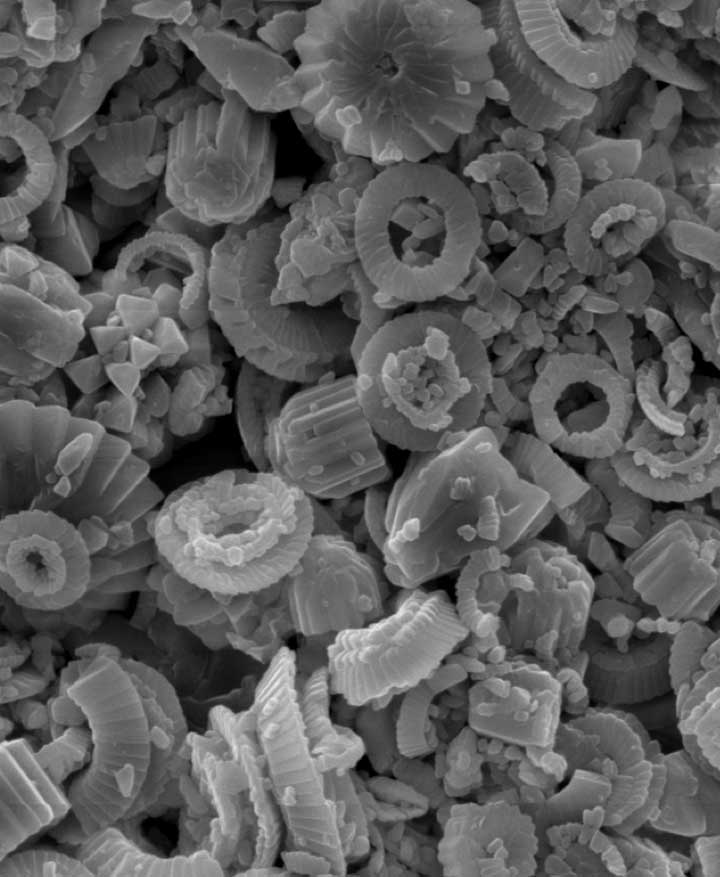+1 713 980 8888
info@oilfindinternational.com
ROUTINE CORE ANALYSIS
Our laboratories are full equipped to perform basic petrophysical measurements on plugs and core samples.
Core Handling and Preservation
Our staff has preserved the largest number of cores in the field in Mexico, both onshore and offshore. Our specialized geologists apply different techniques of preservation and stabilization to ensure the integrity of the rock and to obtain representative reservoir samples.
Spectral Gamma Ray Log
We have modern equipment to obtain spectral gamma ray log of the core to do lithological identification as well as depth correlation between wireline logs taken in site.
Core Sampling and Stabilization
We offer a variety of core sampling services using different fluids, depending on the lithology of interest and the subsequent analyses to be performed. In addition, we have developed a number of specialized techniques for sampling unconsolidated cores.
Samples Cleaning, Drying and Fluids Saturation
We are fully equipment to perform different cleaning methods, to remove the original fluids from the rock pores, as well as the capability to manage large volumes of samples and determine their fluids saturation. We have experienced and qualified personnel in the use of solvents, prepared to make decisions according to the situation during the sample cleaning process.
Core Photography
We offer different techniques of core and samples photography to document the different lithological, sedimentary, and diagenetic characteristics present in rocks and sediments. Such services include full-diameter or slabbed core photography, circumferential photography and acquisition of high resolution images with white light and UV light.


SPECIAL CORE ANALYSIS
Our laboratories have automated equipment to perform a variety of special core analyses, which are extremely important to complement petro physical studies of the reservoir rocks, in order to accurately estimate the hydrocarbon contents and suggest different enhanced recovery strategies.
Electrical Properties
With our electrical properties system we perform a continuous measurement analysis that allows us to model the behaviour of the rock in resistivity measurements, achieving a reliable stability, both for the calculations of the Resistivity Formation Factor (FF) as well as the formation Resistivity Index (IR) at different saturations. With these analyses, we determine 'm' and 'n' parameters, widely used in petro physical studies. The cation exchange capacity is a parameter used to correct the clay content present in the formation, to determine if we offer the multiple salinity method (CoCw).
Capillary Pressure (Porous Plate, Centrifuge, Mercury)
We possess different equipment and methods to measure the formation capacity to retain a fluid. With these methods, we determine the capillary pressure, which according to the utilized fluid system it allows to evaluate the reservoir rock quality, the distribution and size of the pore throats, and even the wettability of the rock can be qualitatively estimated. The available techniques are: Porous Plate, Centrifuge and Mercury Injection.
Wettability (Amott/USBM)
Wettability is an important parameter that affects the pressure, flow and distribution of various fluids in a reservoir; it is also determinant to the capillary pressure, relative permeability and even the electrical properties of the rock, so it is essential to know the preferential wettability of the reservoir for future petro physical core studies. These analyses can be performed in fresh samples and also in samples restored with crude oil through an aging process. We offer both Amott and USBM methods.
Displacement Tests
Our laboratories have great capacity to perform different tests at constant flow or at constant pressure. Among the tests that we offer are rock sensitivity to different fluids, critical velocity, evaluation of drilling, completion and injection fluids, rock-fluid compatibility, fluid-fluid compatibility, rate sensitivity testing and return permeability.
Relative Permeability curves
We also perform relative permeability tests both steady- and unsteady-state, at ambient or full reservoir conditions.
Hydrostatic Compressibility of the Rock
The reservoir pressure drop is a critical factor that must be taken into account to determine the estimated hydrocarbon reserves. The hydrostatic compressibility test of the rock allows the calculation of this factor, making it a highly demanded laboratory analysis.
GEOLOGICAL SERVICES
The study of geological and petro physical characteristics is required to optimize the exploitation of the reservoirs. OILFIND INTERNATIONAL geological services team has an extensive experience in the studies of oil and gas fields. As part of our staff we have terrigenous and carbonated rocks specialists.
The geological services we offer include Terrigenous and Carbonate Rocks Petrography, Fluorescence Petrography, Core Sedimentology Studies, Mineralogical Analysis by X-Ray Diffraction (XRD), Acquisition and Description of images with the Scanning Electron Microscope (SEM), as well as Energy Dispersive Spectroscopy (EDS). We also offer Integrated Reservoir Studies, Reservoir Quality Assessment and Integration of Geological Information with well logs.
Petrography
Using petrographic microscopes, we analyse the texture and mineralogical characteristics, the primary and secondary porosities, as well as the presence of hydrocarbons and depositional environments in the rocks found through the geological sequence. We offer general petrography, point count, and fluoroscopy analysis.
Sedimentology
We perform core descriptions from a sedimentological approach, highlighting the lithological characteristics, sedimentary structures, textural changes, fossils, types of porosity and types of hydrocarbon impregnation, which we adjust with the curves of the geophysical logs. This information is key for the geological interpretation of basins and the characterization of hydrocarbon reservoirs.
X-Ray Diffraction Analysis
We provide mineralogical identification through the reliable X-Ray Diffraction method. We own high resolution equipment to meet all your expectations, capable of providing information of all the components that conform the rock or sediment.
Grain Size Analysis
We offer the service of particle size determination by two methods: Laser Diffraction Method (LPSA) and Sonic Sieving Apparatus.
Scanning Electron Microscope
We offer Scanning Electron Microscope (SEM) studies, which allow us to observe and characterize the analysed materials, as well as morphological information up to 300,000X magnifications. This study enables a close look to minerals and pores distribution, the measurement of pore throats, the characterization of clays (detrital and diagenetic) and other authigenic minerals present within the pore throat, thus presenting an invaluable support in the interpretation of the diagenesis of the sample. Through the Energy Dispersive Spectroscopy (EDS) analysis, we provide certainty regarding the mineralogical identification of the rock.
Rock Mechanics
Our geomechanics and special core analysis laboratory provides standard and customized testing and consulting services to aide operators in drilling, completion and field development of unconventional reservoir. Extensive amount of testing has been performed to provide critical rock mechanics testing results for geomechanics models inclusive of acoustic velocity and anisotropy measurement as a function of stress.

Our Address
Houston, Texas, USA
Call Us
+1 713 980 8888
Fax Us
+1 832 571 9908
Mail Us
info@oilfindinternational.com
